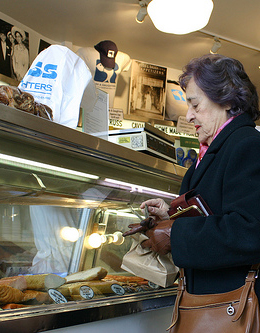A Preserved Delicacy
When it was established in 1914 by Federman’s great-grandfather, Joel Russ, the shop was among many that lined Orchard and Houston Streets selling the same fish, fruit and cheeses.
“This kind of food,” Federman says while motioning toward the shop from her spot on the bench out front, “there was nothing chic about it. It was just daily sustenance for these immigrants.” It took time away from the shop for Federman to see past its function and into its importance. Only when she had physically removed herself from New York did she realize that Russ & Daughters was more than the place where her parents worked and the shop where she played as a youngster.
She stepped in briefly in 2001 to develop Russ & Daughters’ website. Though she enjoyed working with her father and the business, she wasn’t quite ready to make it her career. With the possibility looming of her father selling the shop, Federman’s cousin, Josh Russ Tupper, made his perfectly timed entrance. Tupper, who at that time was an engineer in Oregon, couldn’t bear the thought of Russ & Daughters leaving the family. He negotiated with Mark and decided to step in as the fourth generation.
“Josh’s arrival enabled me to step back at a time when I wasn’t sure that this was what I wanted to do,” she says. This meant for Federman that if and when she returned, it would be on her terms.
“Josh didn’t grow up in the business like I did,” she says. “It gave him the time to learn and to establish himself and gain his own place here without me.”
Before finding his niche in New York, Joel Russ lived in Galicia, an eastern European region that exists today across modern-day Ukraine and Poland. He came to America in 1906 during the migration of eastern European Jews that occurred between the 1870s and the National Origins Act of 1924, which placed tight quotas on the number of immigrants permitted to come to the United States. He left his parents behind to live with his older sister in New York. Her husband had become a Talmudic scholar and virtually gave up earning money to study Torah; she needed Russ’ help to survive.
Russ stands out among immigrants of his time because of his profession as a peddler. According to Hasia Diner, professor of history at New York University, life on the Lower East Side was lived on the street, but the paradigmatic profession of most immigrants during Russ’ time was factory worker. Russ instead assumed the profession of the immigrants from the generation before his, selling salted herring from a pushcart on Orchard Street. After achieving some success, he opened his own shop, selling appetizing (or smoked fish), as well as cheeses and other dairy products, under the name Russ’ Cut Rate Appetizers. It was one of several other shops of the same kind. In the 1920s, he moved it to Houston Street, where it remains to this day.
“When business started to pick up, my great-grandfather had no sons, so he roped in his three daughters,” Federman says. The girls—Ida, Hattie and Anne—would work in the shop every day after school and on weekends.
“Back then, just like on the family farm, you looked to your family for cheap labor,” she explains. “They really didn’t have a choice.”
The girls also created a friendly atmosphere that Russ alone could not. “He was not a people person,” says Federman. “He apparently had a very rough personality, and no patience for people. If you complained about anything, he’d throw you out.” After years of his daughters’ work behind the counters, in 1940 Russ renamed the shop Russ & Daughters Appetizers.
Niki Federman’s grandmother, Anne, had dreams of going to college, though she never decided exactly what she would study. Anne, like her sisters, did not have a role in determining her future; she worked in the shop after completing high school and eventually owned it with her husband.
“She’s 88,” Federman says, “and she still says that she hasn’t figured out what she wants to be when she grows up.”
Federman’s Lower East Side is drastically different from Anne’s. Though the inside of Russ & Daughters may strongly resemble the shop in its original form, full of tile and chrome, the surrounding area has been transformed. The neighboring stores are no longer only Jewish-owned garment shops and delicatessens, but Chinese restaurant supply stores and American pubs and cafes. The old, cramped, overpriced at $10-a-month tenements that had been home to the Jews and other immigrant groups to pass through these streets have been replaced by the new, cramped, and overpriced at $2,200 a month tenements inhabited by hipsters.
Federman’s grandmother began working when the customer base was nearly all Jewish, and she lasted until the late 1970s when the area turned more dangerous. At that point, Federman’s father, Mark, took over, toughing out the period when the tree-lined median across Houston from Russ & Daughters’ front window was cluttered with prostitutes, drug dealers, and burning trashcans. Regular customers, mostly Jewish Americans who lived on the Upper East Side or Long Island, begged him to move the shop. He stuck it out and made it to the 1990s, when the Lower East Side began to change, paving the way for bars and restaurants to flood the area. From there the neighborhood’s real estate market leaped into the condominium boom it is experiencing today.

